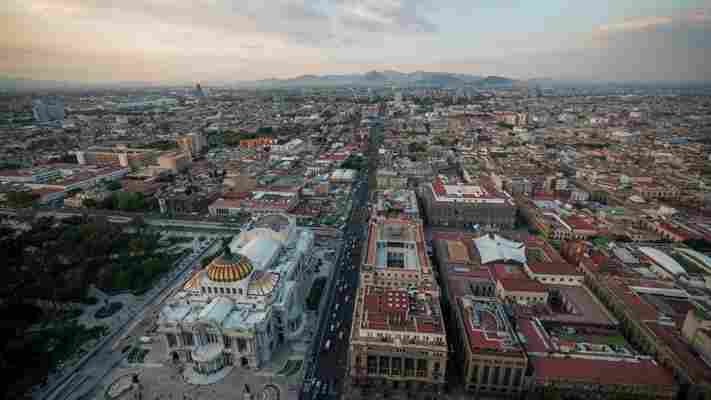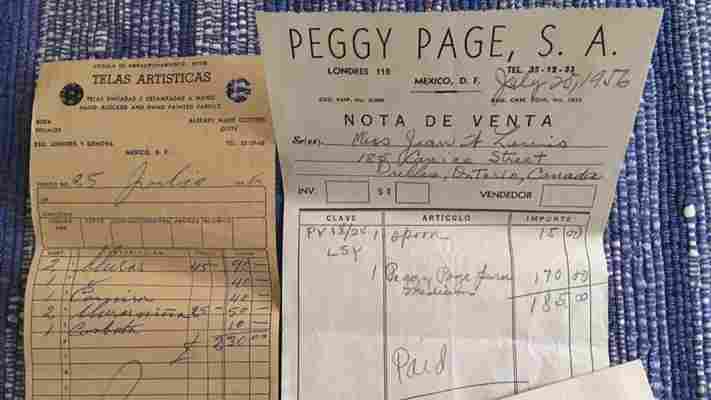If I closed my eyes, I could see her. It was Friday evening in July 1956. Thirty-one and travelling alone, my grandmother had just arrived at Mexico City’s Hotel Geneve . She’d be tired; she would have just stepped off a five-day bus journey from Toronto. More than 60 years later, I could relate. Twenty-six and travelling alone, I had listless bags under my eyes, and I was checking into the same hotel.

There I was – ready for her spirit to guide me
I arrived in Mexico City a few hours before – luckily by plane, but nevertheless exhausted from an overnight jaunt. I’ve been based in Medellín, Colombia, for the last four years, but Mexico City has always lured me. And now, I finally had an excuse to make the trip.
Amidst boxes of old letters belonging to my maternal grandmother Jean, my own mother had recently found her old tour itinerary for Mexico City; it listed the hotel room where my grandmother stayed, the sites she visited and receipts from the stores where she shopped.
Following her itinerary would be an experience, I thought. Perhaps something to pay homage to Jean. So, as her only granddaughter, there I was – ready for her spirit to guide me around the centuries-old city.

More than 60 years after her grandmother, Jean, arrived in Mexico City, writer Victoria Stunt decided to retrace her steps (Credit: robertharding/Alamy)
You may also be interested in: • What it means to know when to leave • Where people speak the Aztec language • The islands of unbridled imagination
My grandmother died when I was 14, and for years, she stood still in my memory as a patient woman with salt-and-pepper hair. Born in China to missionary parents, Jean spent her 20s and early 30s travelling throughout Canada and the United States as a nurse. She raised four kids in the small Canadian city of Thorold and cared for me, my brother and our cousins every summer in nearby Niagara Falls. She obliged us to write summer diaries, habitually loaded us in her minivan and drove us to a nearby pond to catch frogs. When I got tired of playing with the boys, we’d sit down in a quiet spot, I’d lean against her and she’d read me a book.
My grandmother didn’t tell me much about travelling in her younger years; according to my mother, Jean didn’t talk about herself a great deal. That’s why, we both concluded, reading through her old letters and documents was so intriguing. They acquainted us with a different version of Jean.

Stunt was inspired to travel to Mexico City after reading her grandmother's letters and sorting through her old documents (Credit: Victoria Stunt)
Back on that Friday night in 1956, she was young, single and unrestrained. She’d crossed two borders and travelled for days through dusty desert. At a time when many women were expected to stay home and keep house, my grandmother was unfettered in Mexico City – and at liberty to explore it on her own terms.
Based on her crumpled itinerary, Jean left Toronto with a loose tour that listed ‘at leisure in Mexico’ on the itinerary. She rode the Greyhound bus through Detroit, Michigan; Indianapolis, Indiana; Memphis, Tennessee; and Laredo, Texas. According to Jean – and as retold by her father Rundall in a letter to all his children – the ‘buses had gotten progressively shakier and shoddier as she travelled southward’. Several buses had broken down, as had their air conditioning systems.
Still, everything was going as programmed. “ Alors – mañana – over the border!” wrote Rundall in another letter, sent to the Hamilton Hotel in Laredo, where Jean stayed at the US-Mexican border.
Like her grandmother, Stunt stayed in Mexico City’s Hotel Geneve (Credit: Victoria Stunt)
I wondered if my grandmother thought the journey warranted the destination. Hotel Geneve is grand today, and would have been in 1956. Opened in 1907, it was the first hotel in Mexico to admit women travelling alone. Fitting, I thought, for the sake of both Jean and I. The hotel felt like a destination in itself. With a floor-to-ceiling library and a heavy chandelier dominating the lobby, it looked like an old film set. I hardly left on my first day.
However, it seems Jean used Hotel Geneve purely as a base. My grandmother had a packed schedule during her short four-day stay. She’d go to Puebla, a city 135km south-east of Mexico City; to Teotihuacán, a pre-Aztec city settled in 400BC an hour north of the capital with ancient temples, plazas and pyramids spread throughout; and on a tour of Mexico City – although I wasn’t exactly sure where.
The Hotel Geneve was the first hotel in Mexico to admit women travelling alone (Credit: Hotel Geneve)
I’d be in the capital for just five days. And as I spent more time in the city, much of the trip became a game of comparison. I made my way down Paseo de la Reforma, a monumental street three streets up from the hotel, and I tried to imagine what my grandmother saw back then. There certainly wouldn’t be any of today’s glass skyscrapers. The iconic Angel of Independence would be there, towering over the avenue – although the following year, Mexico’s 1957 earthquake would hit, and the gold-covered statue would fall into pieces, later to be replaced.
I spent my days taking the metro around Mexico City, checking off not only the sites my grandmother might have visited but my own bucket list, too: the Coyoacán neighbourhood; the Vasconcelos library; and the Zócalo, a main square in the historical centre of Mexico City built on Aztec ruins.
At a time when many women were expected to stay home and keep house, my grandmother was unfettered in Mexico City
The Zócalo was somewhere I figured my grandmother had gone. A devout Catholic, Jean likely wouldn’t have missed the Metropolitan Cathedral, which was built on the square between 1573 and 1813. In fact, my grandmother rarely missed a Sunday mass. She’d even attend the same services I did with my Catholic school. And when it came time for the students to shake hands in peace near the end of mass, I’d whip my head around to find her. We’d catch eyes from across the church, and she’d hold up her hand in a peace sign. She was a constant, smiling face in the crowd.
I entered the Metropolitan Cathedral – something I thought Jean would be happy about – and then made my way to the centre of the Zócalo. I had my hands in my coat pocket, overcome by the square’s sheer size. Groups of families and friends walked by. But for me, standing idle as people whizzed past, it’d never felt so good to be alone.
Jean’s four-day itinerary included a day trip to Puebla and a tour of the ancient city of Teotihuacán (Credit: Victoria Stunt)
Like many women today, travelling alone is something I do often. But despite speaking fluent Spanish and being based in Latin America for years, some loved ones still thought it’d be better for my partner to be my chaperone. For me, landing in a different country to explore solo still feels like a small push against the social system.
I wonder if Jean felt the same way 62 years ago. At the time, women in Canada were earning around 59 cents to the dollar. Women in Mexico had just got the right to vote in 1953 after years of fighting. Jean supported herself financially and wanted to explore the world; and when she did, she was giving the system a full-out shove.
As my trip progressed, I understood my grandmother was a more relentless traveller than I am. After sitting for five days on a bus, perhaps Jean felt she’d better squeeze everything in. I travelled to Teotihuacán on public transit, but never made the day trip to Puebla as she did. I did try to visit the stores where she shopped, since the addresses were listed on the receipts she kept. At one I found a hotel. The second boutique, simply listed at the ‘corner of Londres and Calle Génova’, was now either a convenience store, taco chain, an off-license liquor shop or a Starbucks.
Stunt made sure to visit the Metropolitan Cathedral, a site her grandmother, a devout Catholic, surely visited (Credit: Mark Kanning/Alamy)
As I retraced her steps, I thought about what drove Jean to break the mould. The needle pointed to her family. Her parents lived in China for 10 years starting in 1921 – in fact, the first time my grandmother travelled was from China to Canada, on a boat for three months as an infant while her parents were on sabbatical.
Landing in a different country to explore solo still feels like a small push against the social system
As an adult, Jean’s parents encouraged her to travel. For months, her mother sent letters convincing Jean to go with her to the Bahamas. They went together in 1955, and her father, Rundall, proudly commented on their trip in letters sent to the family – just as he did when Jean set off for Mexico.
Since moving to Colombia in my early 20s, I’ve never been able to fully explain why I’m there. One year quickly turned into four, and as I matured, the reasons I listed to my family varied. But while in Mexico, Jean reminded me just as her parents did for her, that there was no justification needed. Jean boarded the bus to Mexico City because she felt like it, and that was reason enough.
Following in her grandmother's footsteps reminded Stunt that she did not need to justify her desire to travel (Credit: Victoria Stunt)
My grandmother met my grandfather the year after she returned to Canada from Mexico. They married in 1958, raised their family of four kids, and she continued working another 30 years as a nurse. Her adventurous spirit never faded, though. She’d drive across Canada with her kids – east one time, then west another. And she’d point out car number plates to her grandchildren, encouraging us to imagine far-off places.
Not long before she died, Jean went to China with her younger brother. She said she’d found the house where she was born using only an old photograph. Travelling to connect with the past, I now realise, must be a family trait.
Travel Journeys is a BBC Travel series exploring travellers’ inner journeys of transformation and growth as they experience the world.
Join more than three million BBC Travel fans by liking us on Facebook , or follow us on Twitter and Instagram .
If you liked this story, sign up for the weekly bbc.com features newsletter called "If You Only Read 6 Things This Week". A handpicked selection of stories from BBC Future, Culture, Capital and Travel, delivered to your inbox every Friday.
Leave a Comment